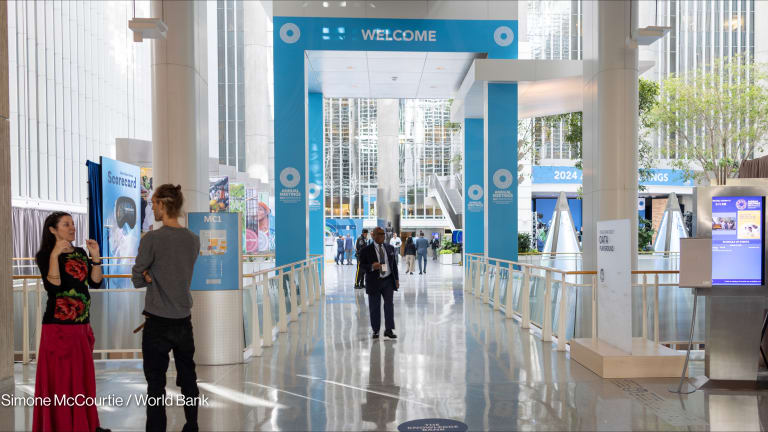BURLINGTON, Vt. — The World Bank has reached the limit of support it can provide to low- and middle-income countries recovering from the coronavirus pandemic, even while acknowledging those nations require more resources than are currently available, the institution’s president said Tuesday.
COVID-19: A conversation with David Malpass
Watch the full conversation between World Bank President David Malpass and Devex President and Editor-in-Chief Raj Kumar.
“We’ve stretched the capacity of the bank in the commitments that we’ve made,” said World Bank President David Malpass during an interview with Devex President and Editor-in-Chief Raj Kumar.
The bank has deployed $14 billion for emergency health response projects in 100 countries and has committed to mobilize $160 billion over the next 15 months, effectively front-loading development investments that would have been made over a longer period of time if the pandemic and resulting economic fallout had not occurred.
While some critics have suggested the bank should find ways to leverage its balance sheets and free up even more financing due to the scale of the COVID-19 crisis, the institution’s current efforts have already tested the bank’s finances and its personnel, Malpass said.
“We were able to go very fast at the beginning in order to address the health crisis by setting up quickly, through a fast-track process, programs in 100 countries, but they were focused on the health crisis itself and the materials that were needed to fight that crisis,” he said.
Those fast-track projects were relatively uniform at a time when every country needed personal protective equipment and other resources to respond to the outbreak, he added.
“As you get into a broader program that’s helping the country move forward, they’re more complicated to work on. I think the bank — at this point — we’re stretching the limits of our financing capacity and of our own personnel and resources,” he said.
As the bank transitions its focus from emergency to recovery programs, governments are looking for ways to shore up social safety nets through programs such as cash and food transfers. But those measures can be difficult to implement on behalf of the world’s most vulnerable populations, since they tend to require an existing relationship between citizens and their government, Malpass said.
“The reality is: It’s hard to find systems that really work for the poorest,” Malpass said.
“Almost by definition, they’re cut off, often, from the marketplace and from their governments, from their health care systems, and so that means bridging that gap,” he added.
Malpass previously served as chief economist at Bear Stearns, an investment bank that failed as a result of the 2008 global recession. Asked whether he saw any similar kinds of systemic risk in the economic crisis brought on by the current pandemic, he said bank capitalization is under pressure in some developing countries, but he added that the impact of the crisis on people’s livelihoods is likely to be the bigger issue.
“The livelihoods of people are being severely disrupted, and I’m not sure those will come back very fast,” Malpass said.
In East Africa, people dependent on livestock have been hit particularly hard by the combination of the pandemic and a locust outbreak in the region.
“That will take years, I’m afraid, to come back,” Malpass said, adding that the bank can help “by setting up systems that allow people to start growing for the next crop season.”
While World Bank staff members are currently working from home due to the pandemic, the institution’s Washington headquarters is located within blocks of the White House, where federal law enforcement officials fired rubber bullets and chemical gas at people protesting police violence and racism earlier this month.
“The reality is: It’s hard to find systems that really work for the poorest.”
— David Malpass, president, World BankProtests in the U.S. have spurred demonstrations around the world, prompting renewed attention to issues of racism within the global development sector and its institutions.
Asked what these civil rights and anti-racist movements mean for the World Bank and for its work in global development, Malpass described both internal and external efforts at the institution to process and confront racism.
“What we’ve done in the World Bank is have a strong internal dialogue with employees of all levels … about racism, about racism within the bank, which we accept ... still is a factor within the bank,” he said.
“We can make improvements in our own culture,” he said, adding that the bank has “set up a task force to try to have an open dialogue and allow all of us to listen to each other.”
“The challenge of having an inclusive workplace, a nonracist, a respectful workplace — that’s a permanent part of how the bank works,” he said.
Malpass added that in the bank’s interactions with its clients, the institution must make clear “that racism has no place in the world.”









